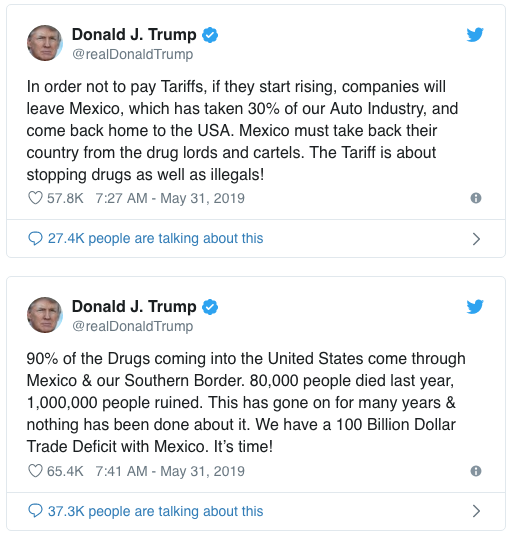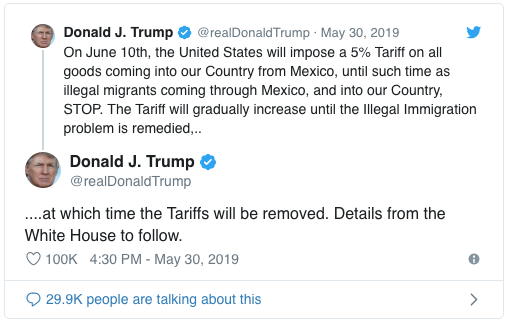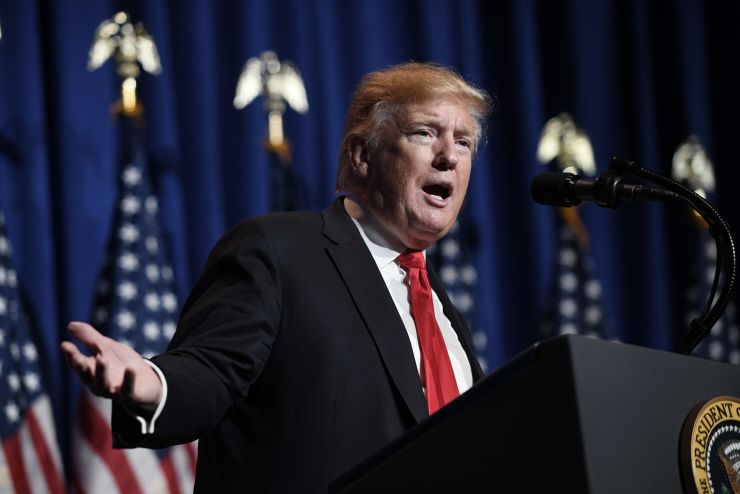KEY POINTS
- President Donald Trump expands the list of bilateral issues between the US and Mexico that he claims would be remedied by the imposition of tariffs on all imports from Mexico.
- Trump claims that if his proposed 5 percent tariff on all Mexican imports goes into effect, not only would Mexico be forced to address the migrant crisis, but that drug smuggling would decrease, U.S. auto manufacturers would return stateside and the U.S. trade deficit with Mexico would improve.
- The tweets put the president squarely at odds with the message coming from his administration, which is that the tariffs are intended only as an emergency measure to help protect U.S. national security, and are totally unrelated to trade negotiations.
President Donald Trump on Friday expanded the list of bilateral issues between the U.S. and Mexico that he claimed would be remedied by the imposition of tariffs on all imports from Mexico. The expanded list includes helping stem the opioid epidemic, and returning auto industry jobs to the United States.
The new issues effectively stretched the president’s personal case for the tariffs beyond that of his own administration, which has insisted that any tariffs would only be intended to address the national emergency of undocumented asylum seekers crossing into the United States.
In a series of tweets Friday morning, Trump wrote that if his proposed 5% tariff on all Mexican imports were to go into effect on June 10, a policy unveiled less than a day ago, then not only would Mexico be forced to address the influx of migrants crossing its borders headed for the United States, but also that drug smuggling would decrease, that U.S. auto manufacturers would return stateside, and that the U.S. trade deficit with Mexico could be remedied.

The tweets put the president squarely at odds with the message coming from both acting White House chief of staff Mick Mulvaney and senior trade advisor Peter Navarro, the two most visible White House aides defending Thursday’s tariff announcement so far.
A White House spokesman did not immediately reply to a request for comment from CNBC on the apparent disconnect between the president’s messaging and that of his top aides.
Appearing Friday morning on CNBC, Navarro pushed back on the notion that the tariffs were intended to bring more manufacturing jobs to the United States from Mexico, saying that the tariffs were “not at all” related to that goal.
“This is strictly about national security and threats to our economy from illegal immigration from a criminal enterprise,” Navarro said.
Trump’s tweet about the auto industry jobs was posted nearly simultaneously with Navarro’s appearance on CNBC.
Speaking on a conference call with reporters late Thursday, Mulvaney likewise insisted that the newly announced tariff threat was totally unrelated to ongoing negotiations between the U.S. and Mexico over a replacement for the North American Free Trade Agreement, known as USMCA, that still needs to be ratified by legislatures in Mexico and the United States.
“These are not tariffs as part of a trade dispute,” Mulvaney said on the call. “These are tariffs as part of an immigration problem. The USMCA is a trade matter and completely separate.”
Also unclear Friday was what, precisely, Mexico would need to do in order to satisfy Trump’s demand that the longtime U.S. ally do whatever it takes to see that the “illegal immigration problem is remedied.”
The abrupt tariff announcement and the potential impact tariffs could have on the prices U.S. consumers pay for goods sent futures markets tumbling Thursday night, a slide that continued into Friday’s trading day.

The United States imported $346.5 billion of goods from Mexico in 2018, an increase of 10.3% over the year prior, according to the Office of the U.S. Trade Representative. The 2018 total accounted for 13.6% of overall U.S. imports that year.

























